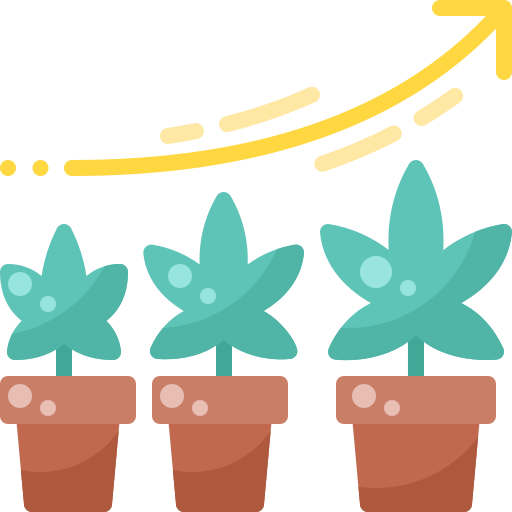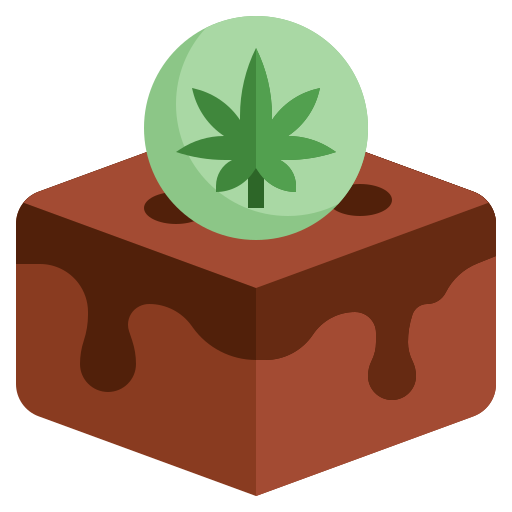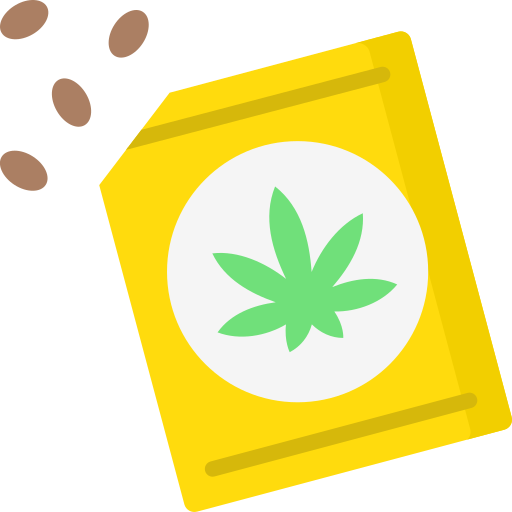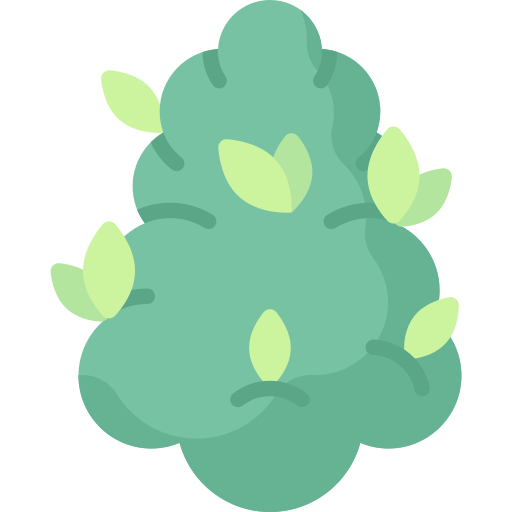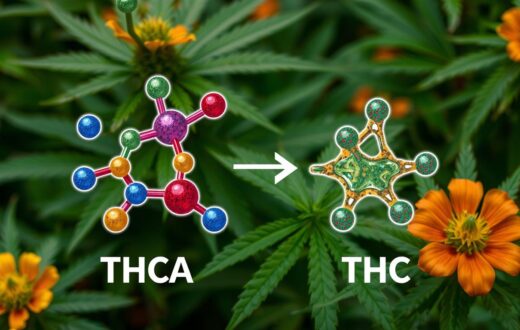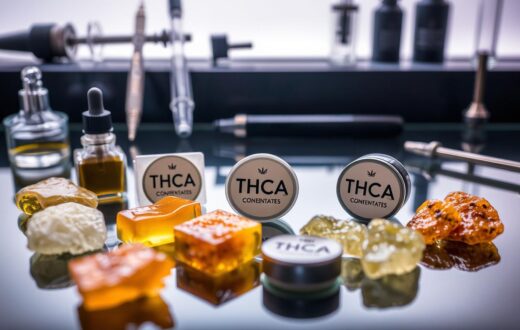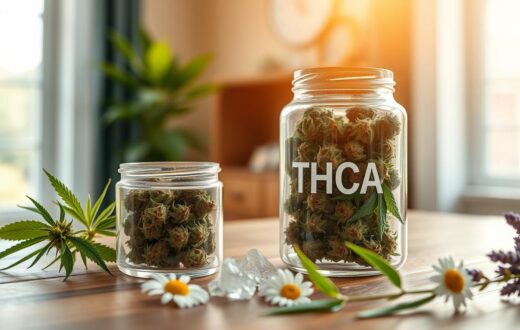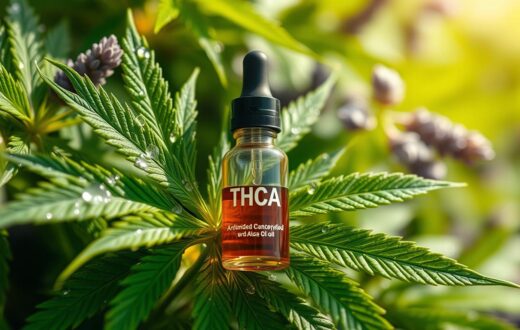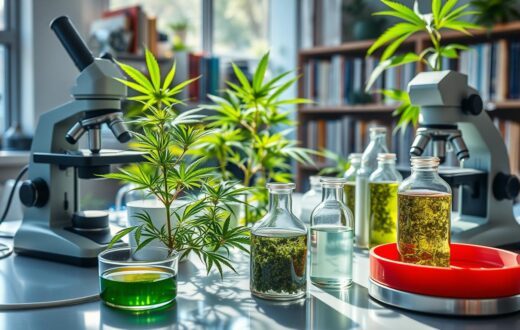Imagine a compound in raw cannabis that could calm your anxiety without making you feel high. This idea is making many people wonder about THCA for anxiety relief. It’s key to understand how cannabinoids and mental health are connected.
THCA, or tetrahydrocannabinolic acid, is found in raw cannabis plants. It’s not psychoactive, unlike THC. This makes THCA interesting for those looking for anxiety relief without the high.
Research on THCA’s effects on anxiety is still new. Yet, some users say THCA helps a lot with anxiety. They find it more effective than usual anti-anxiety meds. Terpenes like linalool and limonene in THCA-rich strains might help calm people down.
But, when THCA is heated, it turns into THC. This can sometimes make anxiety worse for some people. This shows how complex cannabinoids and mental health can be. We’ll look into more research, user stories, and risks of using THCA for anxiety.
Understanding THCA and Its Properties
THCA is a key part of fresh cannabis plants and is getting attention for its health benefits. Unlike THC, THCA doesn’t make you high when you eat it raw. This makes THCA interesting for those looking for medical marijuana for anxiety without the high.
What is THCA?
THCA is found in raw cannabis buds. It doesn’t make you feel intoxicated, which is why researchers are looking into it for anxiety relief. A 2022 study found that 49 out of 53 hemp samples had more THCA than expected, making it hard to tell hemp from marijuana.
How THCA Differs from THC
THC can make you feel intoxicated, but THCA doesn’t. This is important for those looking at medical marijuana for anxiety. THCA patches let you use the compound without getting high. But, it’s important to know that THCA can turn into THC when heated, which could show up on drug tests.
The Role of Cannabinoids in Mental Health
Research on THCA’s effects on mental health is still going on. Studies in animals show it might have anti-inflammatory and neuroprotective effects, which could help with Alzheimer’s. While THC and CBD might help with anxiety, high doses of THC can lead to more mental health problems. Always talk to a doctor and start with small doses when trying THCA for anxiety.
The Science Behind Anxiety
Anxiety affects millions of people worldwide, making daily life tough. It’s important to understand its causes and effects. This knowledge helps those seeking relief.
Common Causes of Anxiety
Anxiety comes from many sources. Genetics and brain chemistry imbalances are key factors. Environmental stress and traumatic experiences also play a part.
Research links anxiety to cannabis use. A meta-analysis found a strong association.
Effects of Anxiety on Daily Life
Anxiety can hurt work, relationships, and overall happiness. A study showed 21% of long-term cannabis users feel anxious or depressed. This shows a complex link between anxiety and substance use.
High-level cannabis use can make anxiety worse. It’s linked to increased anxiety-dependency symptoms.
Traditional Treatments for Anxiety
Cognitive-behavioral therapy and SSRIs are common treatments. Some turn to natural remedies, like cannabis-based therapies for anxiety. Research on d-limonene shows promise in reducing THC-induced anxiety.
Learning more about anxiety and its treatments is key. Always talk to healthcare professionals for advice tailored to you.
The Link Between Cannabinoids and Anxiety Relief
Cannabinoids are key in managing anxiety. Studies reveal that 1 in 5 U.S. adults face an anxiety disorder. This makes it the most common mental illness in the country. Many people use cannabis for relief, with anxiety being a top reason.
How Cannabinoids Interact with the Endocannabinoid System
The endocannabinoid system controls mood and stress. Cannabinoids like THCA and THC interact with it. This interaction may offer anxiety relief. It’s crucial to understand the differences between thca and thc for anxiety.
Research on Cannabinoids and Anxiety
Recent studies have looked into thca’s benefits for anxiety. A study with 300 participants explored legal cannabis’s effect on anxiety. They used products three times a week for four weeks. CBD-dominant products showed the most improvement in anxiety reduction. THC-dominant products did not increase anxiety long-term.
Historical Use of Cannabis for Anxiety Relief
Cannabis has been used for centuries to ease anxiety. Today, 50% of medical marijuana users seek anxiety relief. While ancient use involved whole plant cannabis, modern research focuses on specific cannabinoids like THCA and THC for targeted relief.
Exploring THCA’s Potential Benefits
THCA is a compound in raw cannabis that might help with anxiety. It’s not psychoactive, which means it won’t get you high. It could help reduce stress and improve your overall well-being.
Anti-inflammatory Properties of THCA
Research shows THCA might fight inflammation. This could help ease physical symptoms of anxiety. It might make you feel calmer.
Neuroprotective Effects of THCA
Studies on mice suggest THCA could protect the brain. It might slow down cognitive decline and boost brain health. This could be good for anxiety-related brain issues.
THCA and Stress Reduction
There’s not much research on THCA and stress, but it’s promising. It doesn’t cause the “high” that can make anxiety worse. This makes it a good option for some people.
Strains like AC/DC and Charlotte’s Web are high in CBD and low in THC. They have lots of THCA. Always talk to a professional before trying THCA for anxiety. Everyone reacts differently.
Current Research on THCA for Anxiety
The study of cannabinoids and mental health is moving fast. Research on THCA, a non-psychoactive part of fresh cannabis, is just starting. Scientists are looking into its possible use in treating anxiety, along with other treatments like medical marijuana.
Recent Studies on THCA and Mental Health
Though there aren’t many studies on THCA for anxiety, research on similar cannabinoids is hopeful. A study with 300 people showed that CBD-rich cannabis products work better for anxiety than THC-rich ones. This hints that non-psychoactive cannabinoids like THCA might help with anxiety without causing a “high” from THC.
Limitations of Existing Research
Even though there’s growing interest in cannabinoids and mental health, there’s a lack of big studies on THCA for anxiety. Most of what we know comes from animal studies or personal stories. The fact that many cannabis products aren’t regulated makes it hard to get reliable research results.
Future Directions for THCA Research
Future studies should look closely at how THCA affects anxiety in people. Researchers need to find out the best doses, how safe it is over time, and how it works with other cannabinoids. As more people look into using medical marijuana for anxiety, learning about THCA could lead to better treatments.
User Experiences and Anecdotal Evidence
Many people use cannabis-based therapies for anxiety, including THCA. This non-psychoactive compound in raw cannabis is getting attention for its benefits. Let’s look at what users say about THCA for anxiety and how it stacks up against other options.
Personal Testimonies on THCA for Anxiety
Some users say THCA helps with anxiety relief. They feel less tense without the high THC causes. One user said, “THCA helps me stay calm without feeling impaired.” These stories suggest THCA might be a gentler way to manage anxiety.
Comparing THCA with Other Cannabinoids
Users often say THCA has fewer side effects than other cannabinoids. Unlike THC, THCA doesn’t make you high. CBD is also used for anxiety, but some find THCA more effective. One user mentioned, “THCA works faster for my anxiety than CBD does.”
The Importance of Dose and Administration
Finding the right dose and method is key when using THCA for anxiety. Users recommend starting with low doses, around 5 mg, and increasing slowly. You can consume it by juicing raw cannabis or using THCA-rich products. But remember, heating THCA can turn it into THC, changing its effects. Always talk to a healthcare provider before trying new cannabis-based therapies for anxiety.
The Legal Status of THCA in the U.S.
The legal status of THCA in the U.S. is complex. The Farm Bill of 2018 changed everything. It removed hemp from the list of controlled substances. This opened doors for using medical marijuana for anxiety and exploring THCA benefits for managing anxiety.
THCA and Federal Law
THCA is legal federally if it comes from hemp with less than 0.3% THC. This rule lets THCA products hit the market. Some products can have up to 25% THCA in hemp flower joints.
But, it’s key to remember that THCA turns into THC when heated. This can cause psychoactive effects.
State Legalities Surrounding THCA
State laws on THCA differ a lot. Big markets for THCA include Texas, Tennessee, the Carolinas, and Wyoming. Each state has its own rules, so it’s vital to check local laws before buying or using THCA products for anxiety.
Accessing THCA Products Legally
THCA products come in many forms, like flowers and gummies. Some companies sell THCA flowers with high levels, while others offer Delta-9 THC gummies with different THC and CBD levels. When looking for THCA for anxiety relief, picking reputable sources is key. It’s also important to understand product labels to follow both federal and state laws.
Possible Side Effects and Risks
When thinking about using thc and cbd for anxiety, knowing the side effects is key. THCa is usually not psychoactive but can cause mild discomfort. This might include dizziness, dry mouth, and slight nausea. These effects are often milder than those from THC.
Common Side Effects of Cannabinoids
People using natural remedies for anxiety might feel drowsy or have changes in appetite. They might also see temporary blood pressure changes. Dry mouth, or “cottonmouth,” is common because of less saliva. Some feel mild anxiety or a faster heart rate, especially if they’re new to cannabis.
Risks Associated with Self-Medication
Using THCa products for self-medication comes with risks. Long-term use could harm memory and focus. There’s also a chance of becoming dependent, needing more of the product over time. Plus, the quality of products can vary, with some containing harmful substances or inconsistent THC levels.
Consulting Healthcare Professionals
It’s crucial to talk to a healthcare professional before using THCa or any cannabis for anxiety. They can advise on drug interactions and check for underlying conditions. This is especially important for teens, pregnant women, and those with existing health issues who might be more at risk.
Understanding Dosage and Administration
When looking into thca properties and anxiety relief, knowing the right dosage is key. There’s no fixed amount of THCA for anxiety because everyone reacts differently. This depends on their body, how used they are to it, and their anxiety type.
Recommended Dosage for Anxiety
There’s no set dose for THCA in treating anxiety. It’s best to start with a small amount and slowly increase it. Strains like Remedy and ACDC are good for stress and anxiety without making you high. Lifter, with 16% CBD, helps you relax without losing focus.
Different Consumption Methods of THCA
THCA can be taken in several ways for anxiety relief. You can use raw cannabis, tinctures, or topicals. Each method has its own benefits and how fast it works. For example, Cherry Wine can relax your body and mind without making you feel high.
Factors Influencing Effectiveness
How well THCA works for anxiety depends on a few things. Your body’s chemistry, how bad your anxiety is, and the strain you use all matter. Strains like Harle-Tsu, with lots of CBD, might help lower anxiety and improve mood. Always talk to a doctor before using THCA for anxiety.
How to Choose THCA Products
Finding the right THCA product for anxiety can be hard. It’s important to know what to look for when comparing thca vs thc for anxiety. THCA doesn’t get you high until it’s heated, making it a good choice for those looking into medical marijuana for anxiety.
Identifying Quality THCA Products
Quality THCA products come from trusted sources. Area 52 offers THCA flower in 3.5-gram portions with strains like Lemon Cherry and Zoap. Finest Labs has an average potency of 25% with no additives. These details show the product’s purity and strength.
What to Look for on Product Labels
Product labels should clearly state the THCA content. For example, Hemp Generation’s Cherry Milkshake strain has 24.41% THCA. Look for total cannabinoid percentages and third-party lab testing results. This information helps you make smart choices about using THCA for anxiety.
Suggestions for Reliable Sources
Reliable THCA sources include licensed dispensaries and trusted online retailers. Secret Nature delivers THCA Flower in smell-proof tins. Arete Hemp offers Sour Patch Kidz with 26.7% THCA. Always check the legal status in your area before buying. Remember, THCA turns into THC when heated, so handle it carefully if using for anxiety relief.
The Importance of a Holistic Approach
Exploring natural remedies for anxiety and stress requires a holistic approach. This means looking at the bigger picture of mental health. We need to combine various strategies for the best results.
Combining THCA with Traditional Treatments
Many people find success by pairing THCA with conventional anxiety treatments. While THCA shows promise in managing stress, it’s not enough on its own. Therapy and medication from healthcare professionals are still key for managing anxiety.
Lifestyle Changes to Manage Anxiety
Healthy habits can greatly impact anxiety levels. Regular exercise, a balanced diet, and enough sleep are crucial. These lifestyle changes enhance the benefits of cannabinoids and mental health treatments.
Mindfulness and Alternative Therapies
Mindfulness practices like meditation and yoga can help with anxiety. Some people also find relief through alternative therapies like acupuncture or aromatherapy. These methods can work alongside THCA for a comprehensive approach to managing anxiety and stress.
Remember, everyone’s journey with anxiety is unique. What works for one person may not work for another. It’s important to work with healthcare providers to create a personalized plan. This plan may include traditional treatments, lifestyle changes, and natural remedies for anxiety and stress.
Discussing THCA with Healthcare Providers
Talking to your doctor about using medical marijuana for anxiety is important. About 4% of people have anxiety disorders. It’s worth talking about using THCA for anxiety. Make a list of your symptoms and treatments before your appointment.
Preparing for a Doctor’s Appointment
Do some research on THCA before your doctor’s visit. THCA is not psychoactive and is found in raw cannabis. It has anti-inflammatory and neuroprotective effects, which might help with anxiety. Write down questions about its safety and effectiveness for your condition.
Questions to Ask About THCA
Ask your doctor how THCA might interact with your current medicines. Find out about the right dosage and how to use it. Also, ask about the legal status of THCA in your state, as laws differ. Inquire about possible side effects and how to track your progress if you try THCA.
Importance of Professional Guidance
Getting professional advice is crucial when considering THCA for anxiety. Your doctor can help you understand the benefits and risks based on your health. They can suggest reliable sources for THCA products and recommend starting with small doses. Remember, while THCA looks promising, more research is needed to fully grasp its effects on anxiety.
Community Support and Resources
Living with anxiety can be tough, but you’re not alone. Many people find comfort in connecting with others who share similar experiences. Support groups focused on cannabis and anxiety disorders offer a safe space to discuss concerns and share insights about managing symptoms.
Finding Support Groups
Look for local meetups or online forums dedicated to discussing cannabis and anxiety disorders. These groups can provide valuable perspectives on using THCA for anxiety management. Remember, about 31% of U.S. adults experience an anxiety disorder at some point, so there’s a large community ready to support you.
Online Resources for Information
The internet is rich with resources about THCA benefits for anxiety management. Reputable websites, medical journals, and cannabis education platforms offer up-to-date information. Be sure to verify sources and consult healthcare professionals before making decisions about your treatment.
Engaging with Communities
Join online forums or social media groups focused on cannabis and mental health. These platforms allow you to ask questions, share experiences, and learn from others who’ve explored THCA for anxiety relief. Engaging with these communities can help you make informed choices about incorporating THCA into your anxiety management plan.
Remember, while community support is valuable, it’s crucial to consult with healthcare providers for personalized advice on using THCA for anxiety. They can help you navigate potential benefits and risks based on your specific health needs.
Recognizing the Need for More Research
The field of cannabinoids and mental health is growing fast. We’ve seen a big jump in cannabis use, with 37% of US high school students using it in 2019. With THC levels reaching up to 90% in some products, it’s key to understand how THCA affects anxiety.
The Current State of Cannabinoid Research
Research on cannabinoids and mental health is increasing, but it’s still not enough. Studies show mixed results. While 34% of medical cannabis users say it improves their mood, long-term use might make symptoms worse. This shows we need more studies on THCA and anxiety.
Research Gaps in THCA Studies
THCA studies have big gaps. A recent review found 3,262 studies, but only 78 met the criteria. Only one study looked at cannabidiol for bipolar disorder. We need more research on THCA and anxiety to know its benefits and risks.
Advocating for More Research Funding
With cannabis use on the rise and its impact on mental health, we need more research funding. There are 192 million cannabis users worldwide, and mental health disorders are increasing. We must understand how cannabinoids affect our minds. This will help create safer, more effective treatments for anxiety and other mental health issues.
Making an Informed Decision
Choosing the right way to handle anxiety is key. When looking at thca vs thc for anxiety, knowing their differences is vital. THC causes the “high” from cannabis. THCA, however, is non-psychoactive and found in fresh cannabis plants.
Evaluating Personal Needs
Consider your anxiety symptoms and lifestyle. THCA might be ideal if you want natural anxiety relief without the high. It has shown to reduce inflammation and protect brain cells, aiding in anxiety relief.
Weighing Pros and Cons
THCA offers benefits like fighting inflammation and protecting brain cells. It might help with epilepsy and nausea. Yet, research is still in its early stages.
THC can lower anxiety at low doses but raise it at higher doses. It’s also restricted by law in many areas.
Creating a Wellness Plan
Make a plan that might include THCA and other methods. Talk to a healthcare provider about adding natural remedies for anxiety and stress. A holistic approach often works best.
This could mean lifestyle changes, therapy, and possibly THCA or other cannabinoids. They can be part of your anxiety management plan.
Final Thoughts on THCA and Anxiety
As we conclude our look at THCA for anxiety, it’s clear that this cannabinoid shows great promise. It may help with anxiety without the usual side effects of THC. This is especially important since 1 in 5 U.S. adults deal with anxiety disorders.
Summarizing Key Findings
Research with 300 participants found that CBD-dominant cannabis can lessen anxiety. THCA’s role in anxiety relief is still being studied. Its anti-inflammatory properties and lack of psychoactive effects make it an interesting area for more research. THCA flowers can have up to 40% THCA, which converts to THC when heated.
Encouraging Open-Mindedness in Treatment Options
We suggest being open to different treatment options, including THCA for anxiety. But, it’s important to remember that early and frequent THC use can lead to problems. Always talk to a healthcare professional before adding THCA or any cannabis-based therapies to your routine.
Disclaimer and Support for Further Research
Though the early results on THCA for anxiety are encouraging, more research is needed. We back ongoing studies to learn more about its effects and how to use it best. Remember, everyone reacts differently to cannabinoids. So, use THCA with caution and always under the advice of a professional.
